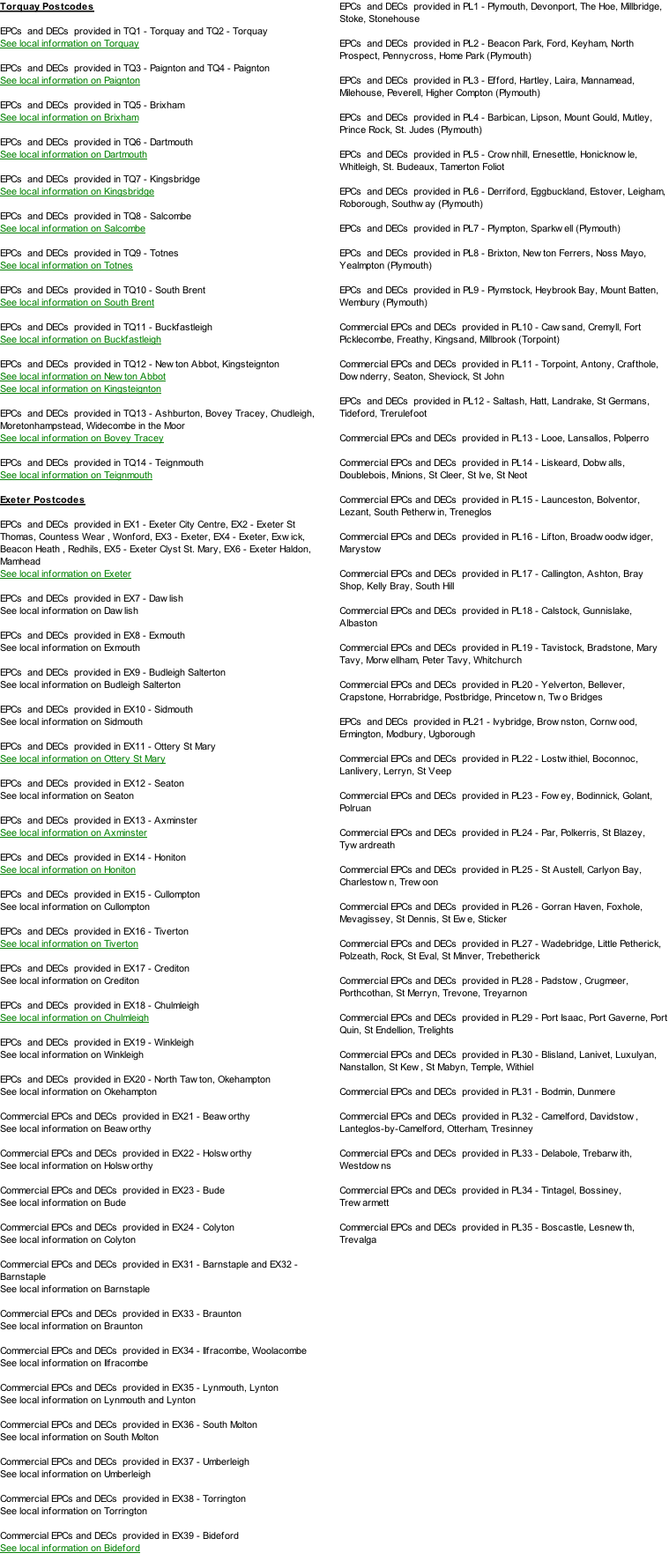
Tel: 01626 365581
Energy Assessment



© 2009 IAS Marketing.net
Energy Performance Certificates (EPCs)
We will assess the property against a defined set of parameters in order to give it an efficiency rating.
From this process we are also able to make recommendations on how to make your home more energy efficient, reducing your carbon footprint and saving you money.
Energy Performance Certificates (EPCs) are required when you offer your home for sale. They are also required when a property is rented.
They must be commissioned before marketing starts and be available within 28 days. (This is due to be shortened to 7 days).

Energy Performance Certificate (EPC)
EPC Devon ~ EPC Newton Abbot ~ EPC Torquay ~ EPC Torbay ~ EPC Exeter ~ EPC Paignton ~ EPC Totnes ~ EPC Plymouth
EPC Ivybridge ~ EPC Teignmouth ~ EPC Dawlish ~ EPC Dartmouth
Independent Domestic Energy Assessor (DEA) in Devon
DEA Devon ~ DEA Newton Abbot ~ DEA Torquay ~ DEA Torbay ~ DEA Exeter ~ DEA Paignton ~ DEA Totnes ~ DEA Plymouth
DEA Ivybridge ~ DEA Teignmouth ~ DEA Dawlish ~ DEA Dartmouth

What is an Energy Performance Certificate?
The EPC is a document which will show an energy efficiency rating for
the energy performance of a home from A to G, where A is very efficient and G is very inefficient. This is similar to the ratings now displayed on domestic appliances such as refrigerators and washing machines.
How does the rating work?
The rating is based on factors such as age, property layout, construction, heating, lighting, and insulation. The ratings are standard so the energy efficiency of one home can easily be compared with another. The average rating for a home is a D/E. Accompanying the energy efficiency rating is an environmental impact rating of the CO2 emissions relating to the property.
What does an Energy Inspection involve?
To complete the assessment we will need to inspect your home and collect information. This will include external or internal measurements, details about the construction, and the type of heating/hot water used in your home. We will need to access all rooms, the boiler and the loft and are required for audit purposes to take photographs of items such as heating, heating controls and meters.
Gathering supporting information before we visit will ensure you get the most accurate rating for your property. Without supporting information or evidence, we may not be able to take account of relevant features during the assessment e.g. insulation which is not visible.
It is helpful if you are able to show us documents indicating:
• When the property was built (searches or deeds may provide evidence)
• Whether or not your property has been extended and when
• If it has been double glazed, any certificates that may be available
• Whether the walls have been insulated and if so whether this is cavity, internal or external insulation
• Boilers and hot water cylinders – when these were installed and any manuals you may have
We will also need to see:
• Location of room thermostats and heating timers
• Location of gas and electricity meters
• The type of heating fuel you use and the types of heating you use for your rooms.
After the visit, we will feed the information gathered during the assessment into a Government approved software programme which will produce your EPC and a recommendation report.
What sort of recommendations will be made and what do they mean?
The recommendation report includes cost-
• Use of low energy light bulbs
• Loft insulation
• Installation of double glazing
• Installation of a condensing boiler
Alongside each improvement recommended in the report is an approximate cost, a typical cost saving per year and the performance rating after undertaking the improvement.
The recommendation report also includes more advanced energy improvements that could be applied to a home to achieve the highest possible energy efficiency standards. Many of these will have a much longer payback period.
Do I have to carry out the recommendations?
The recommendations are for you (and your prospective buyer or tenant). You are under no obligation to act on the recommendations. However, taking action on the recommendations is likely to improve the energy efficiency of your property and reduce your fuel bills.

| Areas Covered |
| Contact |
| Prices |
| Payments |
| Devon EPCs - Energy Performance Certificate |
| Devon Commercial EPCs |
| Devon DECs - Display Energy Certificates DECs |
| Landlords |
| Do I need a commercial EPC |
| Do I need a Display Energy Certificate DEC |
| EPB Regulations |
| Tutorials |
| Articles |